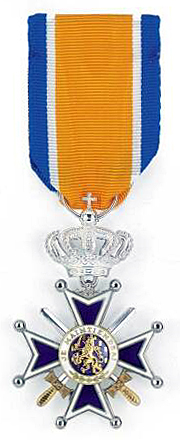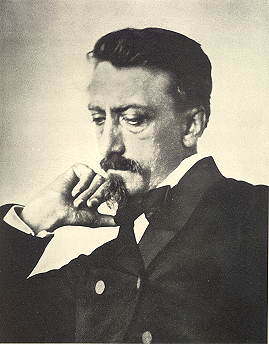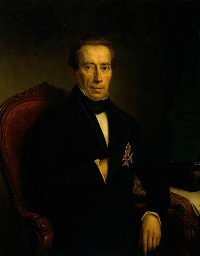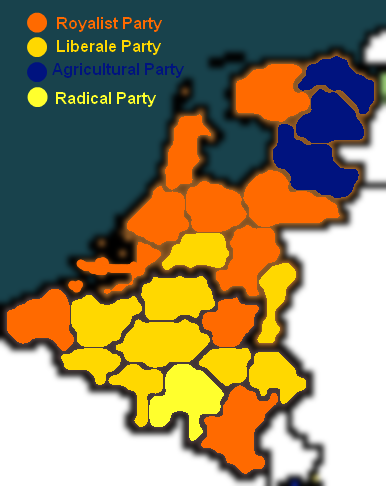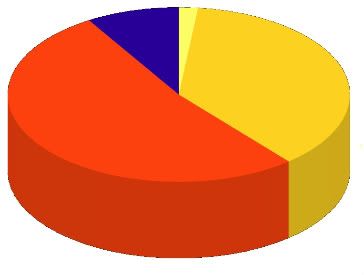Politics in The United Kingdom of The Netherlands Post-1848
The 1848 Constitution and the ONR
The establishment of a democratically-elected parliament in 1848 led to the need for democratic elections. According to the new constitution, only those with a peerage from the monarch could vote, stand for election or sit in the upper house [renamed
Ridderkamer (Knights Chamber), but colloquially called by it's old name
Erste Kamer (First Chamber)]. The Ridderkamer met once every two weeks and was responsible for the creation of new legislature, which if passed, would be passed on to the King for approval. The lower house [
Burgerkamer (Citizen's Chamber) or
Tweede Kamer (Second Chamber)] would meet every week with the members of the Ridderkamer and petition it's members to sponsor proposals for new legislation. Representatives for the Burgerkamer were elected at a provincial level, with any male commoner over the age of 21 able to stand or election or vote but had no official power, they could only suggest.
This was a huge coup by Frederik; any resolution proposed by the lower house no matter how popular could be vetoed by the upper house, and any resolution proposed by the upper house no matter how popular could be vetoed by him. The Staten-Generaal was in effect, a figurehead. Nevertheless it gave the people the impression that they had a say in their own future, and Frederik was so popular among Nederlanders that few expressed outrage at the new constitution, even among the Liberals.
One thing was certain however, in order to keep the liberals happy Frederik would need to make sure they had some representation in the upper house, which would mean he would need to give at least some of them peerages. To combat this problem, Frederik established a new, revolutionary Order of knighthood: The Order of the Dutch Empire (
De Orde van de Nederlandse Rijk) The Order was revolutionary in that it was meant to be awarded to Nederlanders from all walks of life and from all over the Empire.
The new Order had five classes: (in order from highest to lowest)
Ridder Grootkruis (knight grand cross, GNR)
Ridder Commandeur (knight commander, CNR)
Ridder (knight, KNR)
Schildknaap (squire, SNR)
Page (PNR)
Order of the Dutch Empire: Third Class (Ridder). Although only the top three classes were considered knights, the ONR of any class was still considered a peerage and thus any recipient was entitled the right to vote
The first ONR was awarded on the 28th of February (King's Birthday) 1851, roughly 18 months before the first elections were scheduled (August 1852). the Order has been awarded on the birthday of the reigning monarch ever since. Recipients included military men such as Ruben van Wassenaer (GNR) and David Tasman (CNR), civil servants and bureaucrats such as Liberal leader Johan Rudolf Thorbecke (SNR) and Gouverneur-generaal of the Dutch East Indies, Jan Jacob Rochussen (SNR), scientists and inventors such as Petrus Kipp (PNR) and writers and artists such as Eduard Dekker (PNR). The first foreign recipient was Andries Pretorius, former Prime Minister of the Natalian Republic (CNR) who also became the recipient of the first posthumous award when he died one year later in 1853 (GNR).
The Formation of Parties and The 1852 Election
With the first election set to commence in August 1852, politicians quickly formed factions based on their respective ideologies. By August 1852, politicians were divided into four factions, two major parties and two minor parties.
The Royalist Party: (Oranje Partij) Conservative Faction
The Royalist Party strongly favoured King Frederik's current policies and the 1848 constitution; they supported low taxes and high tariffs, religious pluralism (freedom of religion, but not separation of church from state), increased education and military spending, as well as religious education and keeping Dutch as the language of instruction. Most of their support came from the Pro-Imperialist lobbies, and they were the most vocal supporters of Ethische Politiek and expanding the Dutch Empire. On the 21st of April they elected writer Eduard Dekker as their first leader, with Chief of Staff Ruben van Wassenaer as deputy leader.
Eduard Dekker was chosen due to his popularity with the King and People, and for his role in the old Pro-Imperialist lobby. Although a writer by profession, he had experience in administration, working as a civil servant in the Dutch East Indies
The Liberale Partij: (Liberal Party) Reformist Faction
The Liberale Party was made up by republican and bourgeois elements in Dutch society, thus they were strong campaigners of Free Trade and further political reforms, like increasing the vote to commoners and increasing the legislative power of the Burgerkamer, stopping short of full republicanism instead favouring a constitutional monarchy in the style of Great Britain. They favoured keeping the status quo in regards to religious and colonial policy. They were led by political veteran Professor Johan Rudolf Thorbeke with Gerrit Schimmelpenninck serving as deputy leader.
Thorbecke was chosen as leader due to his popularity among the people of The Netherlands and the respect he commanded in Dutch political circles. He was elected party leader on February 1st 1853 after defeating Jacob de Kempenaer. Gerrit was chosen as deputy leader because Jacob resigned from politics shortly after.
The Agricultural Party: (Landbouw Partij) Reactionary Faction
The Agricultural Party was made up of "Traditional" Aristocrats, primarily land and plantation owners. They were deeply conservative and strongly favoured the monarchy and the Reformed Church. They supported the disillusion of the Burgerkamer, restricting the civil rights of Catholics, the establishment of a "Jizya" tax to be paid by all Catholics and non-Protestants, high tariffs and intervention in South Africa on behalf of the Boers. Like the Royalists they favoured expanding the empire, but promoted a return to the Cultivation System and the revocation of Ethische Politiek.
The Radical Party: (Radicalisme) Walloon & Catholic Separatists
The Radical Party were the predecessors of the WNP; officially they favoured secularism, universal suffrage (for men 21 years or over) free trade, reduced education and military spending and government decentralisation. Unofficially they supported the (re)establishment of an independent Belgian state and the Catholic Church and Decolonisation. They had a snowball's chance in hell of winning the Election as there were few Southern Catholic Aristocrats, nevertheless they contested the Election.
Election Results by seats: The Royal Party won the election with a slight majority (10 seats) over the Liberales (9) with the Agricultural Party (3) splitting the conservative vote in the northern countryside.
The Ridderkamer after the 1852 election: 52.3% Royalist, 37.1% Liberale, 8.8% Agricultural and 1.8% Radical
The Royalist Party had won the right to form a minority government by entering a coalition with the Agricultural Party. Eduard Dekker was sworn in as the First Prime Minister of The United Kingdom of The Netherlands on the 12th of December 1852.











